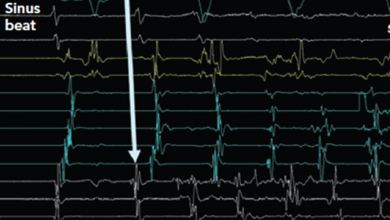Search results
Author(s):
Jonathan S Steinberg
,
David Slotwiner
Added:
3 years ago
Electrical Remodelling
Evidence Supporting Atrial Remodelling
The concept of electrical remodelling was first introduced in 1995 simultaneously by Wijffels et al.1 and Morillo et al.2 who demonstrated that once sustained atrial fibrillation (AF) was induced in goats, or rapid atrial pacing was performed in dogs, physiological changes occurred that favoured the maintenance of AF.3 This led to the…
View more
Author(s):
Michael R Gold
Added:
2 years ago
In this video, Dr Michael R Gold (Medical University of South Carolina, Charleston, SC, US) shares the primary results of the Smart-CRT Trial. The study investigated the efficacy of an atrioventricular optimization algorithm to improve reverse remodeling among patients undergoing cardiac resynchronization therapy (CRT) in the presence of interventricular electrical delay.
Discussion Points…
View more
Author(s):
Jens Kienemund
,
Karl-Heinz Kuck
,
Christian Frerker
Added:
3 years ago
Prevalence of Functional Mitral Regurgitation in Patients with Chronic Heart Failure
Secondary or functional mitral regurgitation (FMR) is a common problem in patients with chronic heart failure (HF) due to dilated cardiomyopathy, regardless of aetiology.1 FMR results from an imbalance between the closing and the tethering forces that act on the mitral valve leaflets.2,3
A chart review of…
View more
A Critical Reappraisal of the Current Clinical Indications to Cardiac Resynchronisation Therapy
Author(s):
Antonio Sorgente
,
Riccardo Cappato
Added:
3 years ago
Article
Author(s):
Khang-Li Looi
,
Anthony SL Tang
,
Sharad Agarwal
Added:
3 years ago
Heart failure (HF) is a growing and major health burden in western countries. The prevalence of HF is estimated at 1–2 % in the western world, and the incidence approaches 5–10 per 1,000 persons per year.1Cardiac resynchronisation therapy (CRT) has been shown in multiplestudies to improve HF symptoms, quality of life and improve survivals.2–6The two landmark studies, Comparison of Medical Therapy…
View more
Author(s):
Nur A Rahmat
,
Gregory YH Lip
Added:
3 years ago
Until recently, the vitamin K antagonist (VKA, e.g. warfarin) class of drugs was the only oral anticoagulant in use. VKAs have important inter- and intra-patient variability, influenced by diet, alcohol and drugs; thus, regular anticoagulation monitoring is necessary. Indeed, VKAs offer their best efficacy and safety when the average time in therapeutic range (TTR) is >65–70 % in a particular…
View more
Author(s):
Geoffrey F Lewis
,
Michael R Gold
Added:
3 years ago
Since the introduction of CRT more than 20 years ago, its role in mild to severe systolic heart failure has become well established. CRT has been shown to decrease mortality, reduce heart failure hospitalisations and improve functional status in patients with NYHA class II–IV heart failure and QRS prolongation, most commonly with LBBB pattern.1 One of the major limitations of CRT implementation…
View more
Miracor Medical Systems GmbH
Supplier
Mapping AF Structural Substrates
Author(s):
Ahmed M Al-Kaisey
,
Ramanathan Parameswaran
,
Jonathan M Kalman
Added:
3 years ago
Article














